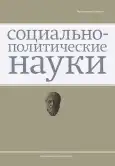Modern Tools of Direct Democracy in the US Public Life
- Authors: Markushina N.Y.1, Parfenenok N.L.1, Fyodorov R.A.1
-
Affiliations:
- St. Petersburg State University
- Issue: Vol 13, No 3 (2023)
- Pages: 111-120
- Section: International Relations, Global and Regional Studies
- URL: https://bakhtiniada.ru/2223-0092/article/view/145556
- DOI: https://doi.org/10.33693/2223-0092-2023-13-3-111-120
- EDN: https://elibrary.ru/GHGHPO
- ID: 145556
Cite item
Abstract
Nowadays, in the era of multiple digital platforms for decision-making, the public and governmental interest towards direct democracy instruments is constantly growing.
The goal of this article is to determine the spheres of social life where direct democracy is most effective. The study will contain the analysis of existing societies where direct democracy is already implemented, the US society in particular. The definition of the modern direct democracy instruments will be given, as well as the legislative base of such instruments in various states of the USA and the criteria for analyzing all precedents of direct democracy in the USA in 2011–2020, taking into consideration their legal status in different states.
The conclusion of this article is the percentage ratio of direct democracy precedents in the USA in different spheres of social life.
Full Text
##article.viewOnOriginalSite##About the authors
Natalia Yu. Markushina
St. Petersburg State University
Author for correspondence.
Email: Nat-markushina@yandex.ru
Doctor of Political Sciences, Professor at the Department of World Politics
Russian Federation, Saint PetersburgNikolay L. Parfenenok
St. Petersburg State University
Email: n.parfenenok@spbu.ru
lecturer at the Department of European Studies department
Russian Federation, Saint PetersburgRoman A. Fyodorov
St. Petersburg State University
Email: Rci.fedorov@gmail.com
researcher at the Department of European Studies department
Russian Federation, Saint PetersburgReferences
- Sullivan J. Direct legislation by the citizenship through the initiative and referendum. New York: True Nationalist Publishing Company, 1893.
- Magleby D. Direct legislation: Voting on ballot propositions in the United States. Baltimore: Johns Hopkins University Press, 2001.
- But J.J. Direct democracy in the constitution: Good or bad for democracy? The Theory and Practice of Legislation. 11.10.2023. Pp. 3–4.
- Schmidt D. Citizen Lawmakers: The ballot initiative revolution. New York: Temple University Press, 1989. Pp. 3–24.
- Mack A., Joy J. Marijuana as Medicine? The Science Beyond the Controversy. Washington (DC): National Academies Press, 2001. Pp. 23–28.
- Bowler S., Donovan T. Demanding choices: Opinion, voting, and direct democracy. Lansing: University of Michigan Press, 2000.
- Shrag P. Paradise lost: California’s experience, America’s future. San Francisco: The New Press, 1998.
- Ellis R.J. Democratic delusions: The initiative process in America. Topeka: Kansas University Press, 2002. Pp. 46–48.
- Savioz M., Feld L.P. Direct democracy matters for economic performance: An empirical investigation. Kyklos: International Review for Social Sciences, 28.06.2002.
- Matsusaka J. Fiscal effects of the voter initiative: Evidence from the last 30 years. Journal of Political Economy. 01.06.1995.
- Gerber E.R. Interest Group influence in the California initiative process. San Francisco: Public Policy Institute of California, 1998. Pp. 16–23.
- Gerber E.R. Stealing the initiative: How state government responds to direct democracy. Lansing: Prentice Hall, 2001.
- Markushina N.Y., Parfenenok N.L., Simonov D.P. Comparative analysis of US regions by actual and legal status of direct democracy. ORES. 2023. No. 2. Pp. 112–114. (In Rus.)
- Bell S. Do taxes and bonds finance government spending? Journal of Economic Issues. 2000. Vol. 34. No. 3. Pp. 603–620.
- Phillips A. How the Second Amendment was reinterpreted to protect individual rights. Washington Post. 31.05.2022.
Supplementary files










